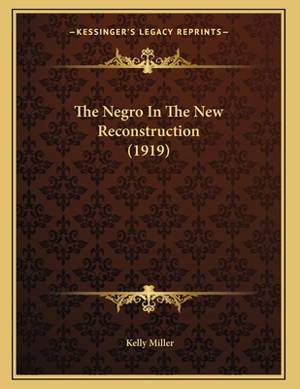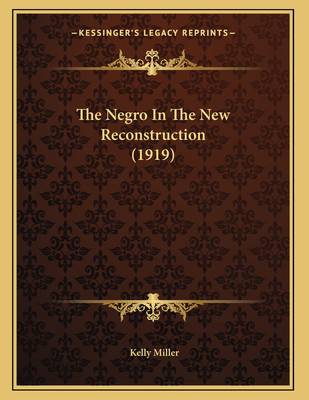
En raison d'une grêve chez bpost, votre commande pourrait être retardée. Vous avez besoin d’un livre rapidement ? Nos magasins vous accueillent à bras ouverts !
- Retrait gratuit dans votre magasin Club
- 7.000.000 titres dans notre catalogue
- Payer en toute sécurité
- Toujours un magasin près de chez vous
En raison de la grêve chez bpost, votre commande pourrait être retardée. Vous avez besoin d’un livre rapidement ? Nos magasins vous accueillent à bras ouverts !
- Retrait gratuit dans votre magasin Club
- 7.000.0000 titres dans notre catalogue
- Payer en toute sécurité
- Toujours un magasin près de chez vous
Description
The Negro In The New Reconstruction is a book written by Kelly Miller in 1919. The book explores the state of African Americans in the United States during the period of Reconstruction, which followed the Civil War. Miller argues that while Reconstruction had brought some progress for African Americans, it was ultimately a failure due to the entrenched racism and discrimination that persisted in American society.The book is divided into three main sections. The first section provides a historical overview of the period of Reconstruction, including the political and social changes that occurred during this time. Miller argues that while Reconstruction brought some improvements for African Americans, it ultimately failed to address the root causes of racism and inequality in American society.The second section of the book focuses on the challenges facing African Americans in the post-Reconstruction era. Miller describes the various forms of discrimination and violence that African Americans faced, including lynching, segregation, and disenfranchisement. He also discusses the ways in which African Americans responded to these challenges, including through the formation of civil rights organizations and the pursuit of legal remedies.The final section of the book offers a vision for the future of African Americans in the United States. Miller argues that true equality can only be achieved through a fundamental transformation of American society, one that addresses the root causes of racism and inequality. He calls for a new Reconstruction, one that is based on justice and equality for all Americans.Overall, The Negro In The New Reconstruction is a powerful and insightful critique of American society during the period of Reconstruction and beyond. Miller's analysis remains relevant today, as the struggle for racial justice and equality continues in the United States.This scarce antiquarian book is a facsimile reprint of the old original and may contain some imperfections such as library marks and notations. Because we believe this work is culturally important, we have made it available as part of our commitment for protecting, preserving, and promoting the world's literature in affordable, high quality, modern editions, that are true to their original work.
Spécifications
Parties prenantes
- Auteur(s) :
- Editeur:
Contenu
- Nombre de pages :
- 28
- Langue:
- Anglais
Caractéristiques
- EAN:
- 9781163925089
- Date de parution :
- 10-09-10
- Format:
- Livre broché
- Format numérique:
- Trade paperback (VS)
- Dimensions :
- 216 mm x 279 mm
- Poids :
- 117 g

Les avis
Nous publions uniquement les avis qui respectent les conditions requises. Consultez nos conditions pour les avis.






